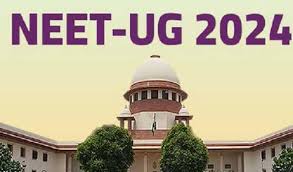NEW DELHI: The Supreme Court on Friday refused to defer the counselling for the controversy-ridden NEET-UG examination scheduled to kick off on July 6, saying it is not an “open and shut” process.
The apex court issued notices to the National Testing Agency (NTA), the Centre and others on a petition seeking cancellation of the May 5 exam over alleged irregularities. A Vacation Bench of Justices Vikram Nath and SVN Bhatti posted the matter for hearing on July 8 along with other pending pleas alleging irregularities. The counsel appearing for the petitioners urged the bench that the counselling process may be paused for two days as the apex court is scheduled to hear all these pleas on July 8.
“I am not seeking any stay of counselling. I am only praying that the counselling which is scheduled to be held on July 6 may be paused for two days only. The reason being that the main matter is listed on July 8,” the lawyer argued.
The Bench observed, “We have been hearing the same statement. Don’t think otherwise for interrupting you. Counselling does not mean open and shut. It is a process. That process commences on July 6.” When the Bench asked about the duration of the first round of counselling, one of the lawyers appearing in the matter said it will last around a week.
Meanwhile, the Centre on Friday operationalised a stringent law that aims to curb malpractices and irregularities in competitive examinations and entails provisions for a maximum jail term of 10 years and a fine of up to Rs 1 crore for offenders.
Nearly four months after President Droupadi Murmu gave assent to The Public Examinations (Prevention of Unfair Means) Act, 2024, the Personnel Ministry on Friday night issued a notification, saying the provisions of the law will come into force from June 21. The move assumes significance amid a raging row over UGC-NET, 2024, exam’s question paper leak.
The Act aims to prevent unfair means in the public examinations conducted by the UPSC, the Staff Selection Commission, the railways, banking recruitment examinations and the NTA, among others. Before this legislation, there was no specific substantive law to deal with unfair means adopted or offences committed by various entities.


